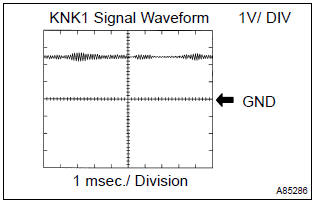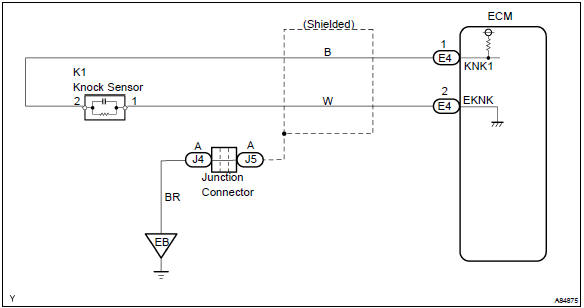Toyota Corolla (E120) 2002–2008 Repair Manual / Diagnostics / Sfi system / Knock sensor 1 circuit / Circuit description
Toyota Corolla (E120): Circuit description
A flat type knock sensor (non–resonant type) has the structure that can detect the vibration in a wider band of frequency from about 6 khz to 15 khz and has the following features.
Knock sensors are fitted on the cylinder block to detect the engine knocking.
The sensor contains a piezoelectric element which generates a voltage when it becomes deformed, which occurs when the cylinder block vibrates due to knocking. If engine knocking occurs, the ignition timing is retarded to suppress it.

Hint
: if the ecm detects the dtc p0325, it enters the fail–safe mode in which the corrective retarded angle value is set to the maximum value.

Reference: inspection using the oscilloscope.
- After warming up run the engine at 4,000 rpm, check the waveform between terminal knk1 and eknk of the ecm connector.
Monitor description
The knock sensor, located on the cylinder block, detects spark knock. When spark knock occurs, the sensor picks–up vibrates in a specific frequency range. When the ecm detects the voltage in this frequency range, it retards the ignition timing to suppress the spark knock.
The ecm also senses background engine noise with the knock sensor and uses this noise to check for faults in the sensor. If the knock sensor signal level is too low for more than 10 seconds, and if the knock sensor output voltage is out of normal range, the ecm interprets this as a fault in the knock sensor and sets a dtc.
Monitor strategy

Typical enabling conditions

Typical malfunction thresholds

Wiring diagram

Other materials:
Circuit description
When driving uphill under cruise control, in order to reduce the number of
shifting due to on–off overdrive
operation and to provide smooth driving, when down shifting in the
electronically controlled transmission occurs,
a signal to prevent upshift until the end of the uphill slope is sent ...
Diagnostic trouble code chart
Hint:
when the srs warning light remains lit up and the dtc is the normal
code, this means a voltage source
drops.
This malfunction is not stored in memory by the airbag sensor assy center
and if the power source
voltage returns to normal, the srs warning light will autom ...
Overhaul
Hint: components:
1. Drain manual transaxle oil (m/t transaxle)
torque: 39.2 Nvm (400 Kgf·cm, 29 ft·lbf)
2. Drain automatic transaxle fluid (a/t transaxle)
torque: 17.5 Nvm (178 Kgf·cm, 13 ft·lbf)
3. Remove front wheel
4. Remove engine under cover lh
5. Remove front axle hub lh nut
...


